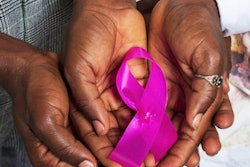
More than 331,000 new cases of breast cancer will be diagnosed in the U.S. this year, and more than 43,000 women are expected to die from breast cancer in 2021 alone, according to the American Cancer Society.
Screening and diagnosis currently are our best defense against breast cancer, since catching the disease early dramatically increases a woman's odds of survival. But women may not be getting the screening they need, due to a lack of insurance coverage for modalities beyond mammography.
All breast cancer screening utilizes mammography, but for many women, mammography alone is insufficient. For example, breast MRI is a critical screening and diagnostic tool for some women, according to BreastCancer.org; it is particularly recommended for women with dense tissue -- which is the case for nearly half of women over the age of 40 in the U.S.
Dense tissue combined with any other risk factors can prompt a physician to recommend breast MRI for screening or diagnosis. A recent study published in Radiology showed that two rounds of MRI screening in patients with extremely dense tissue and no other risk factors can significantly reduce the number of false positives.
Breast MRI has a number of different applications, including the following:
- Screening high-risk women (those at a greater than 20% lifetime risk of breast cancer for reasons such as genetic mutations, recent breast cancer diagnosis in one breast, or strong family history)
- Gathering more diagnostic information about an area of suspicion found on a mammogram or ultrasound
- Monitoring for recurrence after treatment
But are women who need breast MRI able to obtain an exam that is covered by insurance? To address this question, the Brem Foundation to Defeat Breast Cancer and health technology firm Olive AI used data from more than 73,000 claims for breast imaging to explore denial rates for mammography and breast MRI.
The data included healthcare procedures from February 2020 through February 2021 and revealed differences in denial rates for breast cancer screening claims:
| Denial rates for breast cancer screening by modality, February 2020 to February 2021* | ||
| Type of claim | Number of claims | Percent denied |
| Breast MRI | 1,134 | 13.5% |
| Diagnostic mammography and tomosynthesis | 5,503 | 7.5% |
| Total mammography and tomosynthesis | 72,048 | 3.7% |
| Screening mammography and tomosynthesis | 60,503 | 3.1% |
To be clear, although the Affordable Care Act (ACA) covers all screening mammograms, it does not cover diagnostic mammograms and other screening and diagnostic tests for breast cancer, such as breast MRI -- which may explain some of the denial rate variation. It's also true that breast MRI scans are about eight times more expensive than mammograms and are not appropriate for everyone.
But for high-risk women, MRI can be an essential breast-imaging modality because of its accuracy and specificity.
The number of women who may be adversely affected by these denials compels us to ask why these rates vary, why breast MRIs are so much more likely to be denied, and what can be done to ensure clinicians are consistently ordering the appropriate and lifesaving tests and payers are covering and paying for those tests. We believe the differences in denial rates by imaging modality should encourage more studies of access at the point of care; enhanced coordination among health systems and payers; a reinvigorated effort to ensure that screening and early diagnosis are available; and a deeper exploration as to whether patients are getting care that is prescribed to them.
Jonathan Kay is founder of Health Market Experts and a consultant to Olive AI, as well as a board member for the Brem Foundation to Defeat Breast Cancer.
Andrea Wolf, JD, is CEO of the Brem Foundation.
The comments and observations expressed here are those of the author and do not necessarily reflect the opinions of AuntMinnie.com.



















